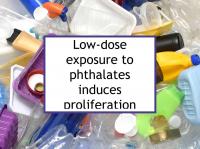Phthalates are chemicals used primarily to impart flexibility and resilience to plastics such as polyvinyl chloride. Phthalates are also used as stabilizing agents in some personal care products. Now a new study has reported that even low levels of phthalates can increase proliferation and promote cell cycle progression in normal breast cells.
Phthalate exposure
Food packaging (especially soft plastic food packaging), lotions, creams, hair products and other personal care products are the main sources of phthalate exposure for most people. However, note that disposable diapers, vaginal douching, sanitary pads, and coffee brewed using coffee capsules can be significant sources of exposure for some individuals. Phthalates such as diethyl phthalate (DEP) and dibutyl phthalate (DBP), which are used in lotions and creams, have been shown to be absorbed through the skin.
There is very little data on the health effects of chronic low-level phthalate exposure. In February 2023, the Environmental Protection Agency (EPA) announced that it is starting to develop a set of principles for evaluating cumulative risks posed by the following phthalates: dibutyl phthalate (DBP), diisobutyl phthalate (DIBP), butyl benzyl phthalate (BBP), di-n-pentyl phthalate (DnPP), di(2-ethylhexyl) phthalate (DEHP), di-n-octyl phthalate (DnOP), diisononyl phthalate (DINP), and diisodecyl phthalate (DIDP). However, under current EPA guidelines, average exposures among U.S. consumers are considered to be below unsafe levels. European regulations are stricter with regard to phthalate exposure.
Latest research finds even low phthalate exposure harmful
The study referenced above was designed to investigate the impact of low-dose exposures to the phthalates butyl benzyl phthalate (BBP), di(n-butyl) phthalate (DBP), and di(20ethylhexyl) phthalate (DEHP) on breast cancer initiation. To conduct the study, the authors treated (MCF-10A) normal breast cells either with phthalates, estrogen (17β-estradiol), or neither (control). Cell viability, cell cycle progression, apoptosis (programmed cell death), and expression levels of relevant proteins were assessed.
Exposing the breast cells either to low (10 nM) or higher (100 nM) phthalate levels had results similar to exposure to estrogen: (1) significantly higher proportion of live, healthy cells; (2) less apoptosis; and (3) increased number of cells in the S (DNA synthesis) and G2/M (cell growth/mitosis) phases of the cell cycle compared to untreated control cells. This was accompanied by changes in protein expression consistent with increased cell growth and proliferation. The effects of all three phthalates were found to be dose-dependent.
The authors conclude that phthalates can induce cell cycle progression and proliferation, as well as inhibit apoptosis of normal breast cells, even at levels of exposure below their no-observed-adverse-effect concentration (per current standards). Therefore, the possibility that chronic phthalate exposure could result in breast tumorigenesis should be considered, according to the authors.
Please see our article on phthalates for more information.
